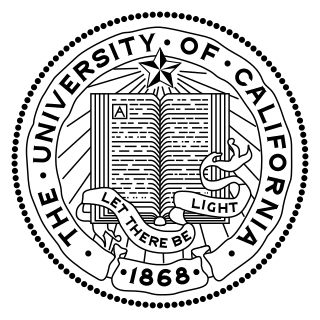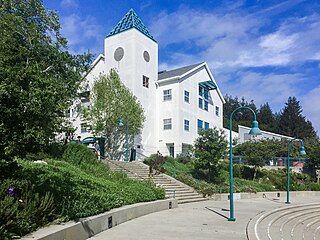
The University of California (UC) is a public land-grant research university system in the U.S. state of California. Headquartered in Oakland, the system is composed of its ten campuses at Berkeley, Davis, Irvine, Los Angeles, Merced, Riverside, San Diego, San Francisco, Santa Barbara, and Santa Cruz, along with numerous research centers and academic abroad centers. The system is the state's land-grant university. Major publications generally rank most UC campuses as being among the best universities in the world. In 1900, UC was one of the founders of the Association of American Universities and since the 1970s seven of its campuses, in addition to Berkeley, have been admitted to the association. Berkeley, Davis, Santa Cruz, Irvine, Los Angeles, Santa Barbara, and San Diego are considered Public Ivies, making California the state with the most universities in the nation to hold the title. UC campuses have large numbers of distinguished faculty in almost every academic discipline, with UC faculty and researchers having won 71 Nobel Prizes as of 2021.

The University of California, Santa Cruz is a public land-grant research university in Santa Cruz, California. It is one of the ten campuses in the University of California system. Located on Monterey Bay, on the edge of the coastal community of Santa Cruz, the campus lies on 2,001 acres (810 ha) of rolling, forested hills overlooking the Pacific Ocean. In Fall 2022, its ten residential colleges enroll some 17,500 undergraduate and 2,000 graduate students.

Kresge College is one of the residential colleges that make up the University of California, Santa Cruz. Founded in 1971 and named after Sebastian Kresge, Kresge college is located on the western edge of the UCSC campus. Kresge is the sixth of ten colleges at UCSC, and originally one of the most experimental. The first provost of Kresge, Bob Edgar, had been strongly influenced by his experience in T-groups run by NTL Institute. He asked a T-group facilitator, psychologist Michael Kahn, to help him start the college. When they arrived at UCSC, they taught a course, Creating Kresge College, in which they and the students in it designed the college. Kresge was a participatory democracy, and students had extraordinary power in the early years. The college was run by two committees: Community Affairs and Academic Affairs. Any faculty member, student or staff member who wanted to be on these committees could be on them. Students' votes counted as much as the faculty or staff. These committees determined the budgets and hiring. They were also run by consensus. Distinguished early faculty members included Gregory Bateson, former husband of Margaret Mead and author of Steps to an Ecology of Mind; Phil Slater, author of The Pursuit of Loneliness; John Grinder, co-founder of Neuro-linguistic programming and co-author of The Structure of Magic; and William Everson, one of the Beat poets.

Benjamin F. Porter College, known colloquially as Porter College, is a residential college at the University of California, Santa Cruz. It is located on the lower west side of the university, south of Kresge College and north of Rachel Carson College. The college was founded in 1969 as College Five and formally dedicated on November 21, 1981. On that day the college was given the motto Ars Longa, Vita Brevis, and a series of college symbols, including a faculty mace and a college bell, were inaugurated.

Crown College is one of the residential colleges that makes up the University of California, Santa Cruz, United States.

The first of the ten residential colleges of the University of California, Santa Cruz, established in 1965, Cowell College sits on the edge of a redwood forest with a remarkable view of Monterey Bay. The college is named for Henry Cowell and the Cowell family, who donated the land that UCSC is built upon, previously known as the Cowell Ranch.

Adlai E. Stevenson College, known colloquially as Stevenson College, is a residential college at the University of California, Santa Cruz. Currently, the college is host to the Linguistics Department, as well as many humanities faculty.

Merrill College is a residential college at the University of California, Santa Cruz. The theme of the college, and the name of its freshman core course, is "cultural identities and global consciousness."

Oakes College is a residential college at the University of California, Santa Cruz. It is on the southwestern corner of the campus, south of Rachel Carson College and east of the Family Student Housing complex.

Rachel Carson College is a residential college at the University of California, Santa Cruz. Named in honor of conservationist Rachel Carson, it is on the west side of campus, north of Oakes College and southeast of Porter College. The current provost of the college is Professor Sue Carter, also a faculty member of UCSC's Physics Department. The theme of its freshman core course is Environment and Society.

College Nine is a residential college at the University of California, Santa Cruz. The university's first new college in nearly 30 years, College Nine was founded in 2000 although the dorms were not finished until 2002. It is located on the north side of campus, east of Science Hill and west of Crown College. The college theme is International and Global Perspectives. All freshmen students are required to take a core course on this particular theme.

The Baskin School of Engineering, known simply as Baskin Engineering, is the school of engineering at the University of California, Santa Cruz. It consists of six departments: Applied Mathematics, Biomolecular Engineering, Computational Media, Computer Science and Engineering, Electrical and Computer Engineering, and Statistics.
History of Consciousness is the name of a department in the Humanities Division of the University of California, Santa Cruz with a 50+ year history of interdisciplinary research and student training in "established and emergent disciplines and fields" in the humanities, arts, sciences, and social sciences based on a diverse array of theoretical approaches. The program has a history of well-known affiliated faculty and of well-known program graduates.
The UCSC Silicon Valley Initiatives are a series of educational and research activities which together increase the presence of the University of California in Silicon Valley. To that end, UC Santa Cruz has set up a 90,000 square-foot satellite campus called the University of Santa Cruz Silicon Valley Campus (SVC), currently located on Bowers street in Santa Clara, California, where it has been since April 2016 The Initiatives, still in the early stages of their development, have had ambitious hopes attached to them by UCSC, among them the possibility of a home for the University's long-planned graduate school of management and the Bio|Info|Nano R&D Institute. It currently houses professional the SVLink incubator-accelerator program, programs and a distance education site for the UCSC Baskin School of Engineering, the UCSC Silicon Valley Extension, the Office of Industry Alliances and Technology Commercialization leadership, and the University of California's online learning program, UC Scout.

The University of California, Santa Cruz (UCSC) Coastal Science Campus consists of five main institutions: UCSC's Long Marine Laboratory, UCSC's Coastal Biology Building, the NOAA Southwest Fisheries Science Center, the Seymour Marine Discovery Center, and the California Marine Wildlife Veterinary Care and Research Center. The physical location of the campus is at the western end of Santa Cruz, California, roughly 10 minutes away from UCSC's main campus, and is located adjacent to the Younger Lagoon Reserve. Walking trails exist throughout the campus and are used by area residents for walking, biking, and bird watching.

Mary Rita Cooke Greenwood is a nationally recognized leader in higher education, nutrition, and health sciences. Additionally, her research has been extensively published, internationally recognized, and has earned awards.

The UC Santa Cruz Banana Slugs are the athletic teams that represent the University of California, Santa Cruz. The Banana Slugs compete in Division III of the NCAA, mostly in the Coast to Coast Athletic Conference (C2C). There are fifteen varsity sports – men's and women's basketball, tennis, soccer, volleyball, swimming and diving, cross country, track & field, and women's golf. UCSC teams have been Division III nationally ranked in tennis, soccer, men's volleyball, and swimming. UCSC maintains a number of successful club sides.
Gina Dent is an associate professor of Feminist Studies at UC Santa Cruz. She is associate dean of diversity, equity, and inclusion for the Humanities Division at UC Santa Cruz. She co authored the 2022 book Abolition. Feminism. Now. with her partner, Angela Davis; Erica Meiners, and Beth Richie.
The Feminist Studies Department at the University of California, Santa Cruz constitutes one of the oldest departments of gender and sexuality studies in the world. It was founded as a women's studies department in 1974. It is considered among the most influential departments in feminist studies, post-structuralism, and feminist political theory. In addition to its age and reputation, the department is significant for its numerous notable faculty, graduates, and students.
The 2020 Santa Cruz graduate students' strike was a wildcat strike launched against the University of California, Santa Cruz (UCSC).















